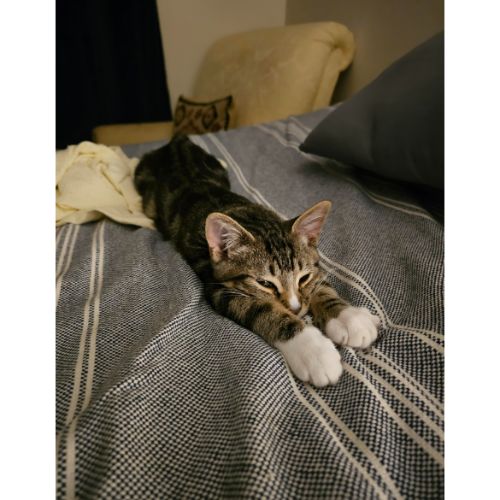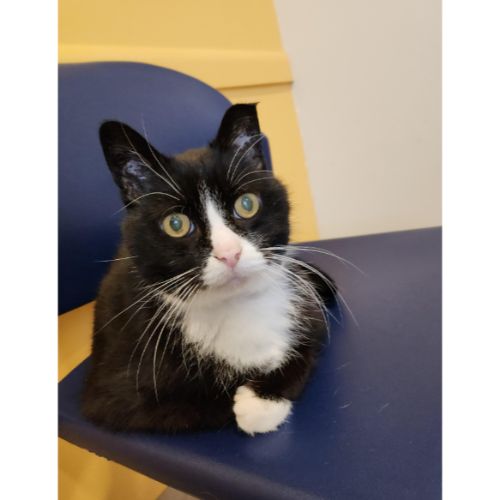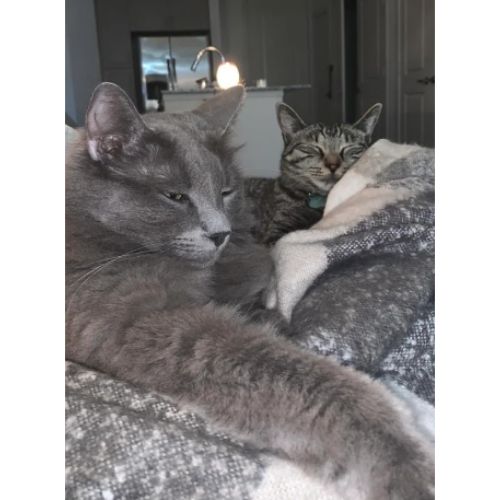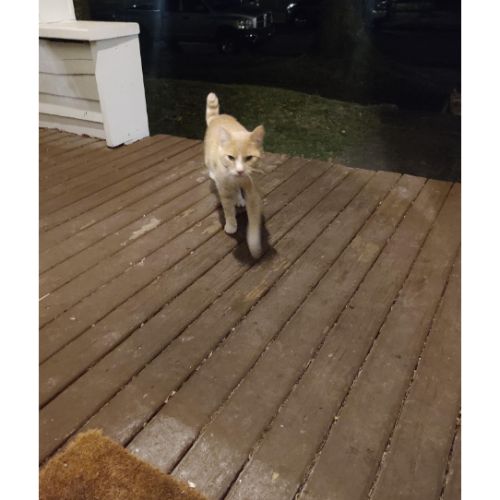
Meowing or “yowling” is a form of communication unique to cats, and while they can be cute, they can also be annoying. This kind of excessive vocalization might take place when we least want it — at night. So, why exactly do cats yowl at night, and what can be done about it?
It’s possible for cats to yowl for a number of reasons, including when they’re hungry, bored, or seeking attention. In addition, cats use their yowls to attract potential mates. Last but not least, a cat’s yowl could indicate discomfort, mental decline, or behavioral problems.
Keep reading to find out some of the various causes of your cat’s nighttime yowling.
Before reading this guide, “Why Do Cats Yowl at Night,” check out: Why Is My Cat’s Tongue Black? Common Reasons and What to Do! (2023) and Do Poodles and Cats Get Along? (2023).
Common Reasons Your Cat May Be Yowling

Your cat may be yowling for a number of common, harmless reasons, which we’ll cover below.
Instinct
Cats aren’t nocturnal like many people think; instead, they’re crepuscular, meaning they’re most active at sunrise and sunset. The small hours of the night and dawn are when your crepuscular hunter is most likely to yowl for attention.
Playing with your cat before bedtime may help quiet her yowling in the early hours. Just make sure you play the game in a way that lets her stalk, catch, “kill,” and consume “prey.”
Overstimulation

Overstimulated cats are more likely to vocalize their distress. Rough play, substantial changes at home, and periods of increased activity can all lead to feline overstimulation.
The first thing you should do is identify the source of stress and take steps to reduce or eliminate it. Some cats become sleepy after experiencing the effects of catnip, so giving your cat a catnip toy or treat just before bedtime may help calm its overactive nerves.
Due to its anti-anxiety and antipsychotic properties, CBD for pets may be beneficial for cats that are catnip-sensitive.
Attention
Bored cats are a real thing. This is especially the case if they are unable to engage in activities such as hunting, stalking, or climbing because of restrictions placed on them by their surroundings.
These signs might indicate that your cat needs more stimulation:
- Nighttime or otherwise excessive vocalization, such as yowling, meowing, or calling
- Lack of interest
- Restlessness
- Overeating
- Causing trouble
- Conflicts with other animals
What’s the best way to ensure your cat never gets bored? The key is to maintain a steady atmosphere while also introducing some element of surprise so that they are forced to challenge themselves.
You should rotate toys in and out of play, and try to provide engaging activities. If you don’t want your cat to start yowling while playing, toys that encourage independent play are a smart choice.
Territorial

The cat’s nighttime yowling may serve as a warning to other cats, animals, and even humans who have invaded her territory. Cats, in general, are quite possessive of their territory.
Caterwauling is another name for this hostile, territorial yowl. If you’ve already consulted with your vet to rule out any potential medical issues, then one of these solutions may help your cat feel at ease:
- Calming pheromone spray for cats.
- Creating a secure environment for your cat.
- Providing fun and stimulating environments for scratching and playing.
Mating
Unspayed female cats can enter heat as young as four months. Female cats will yowl and make other strange noises when they are in heat. In addition, male cats will yowl back with equal volume.
Signs that your cat is trying to find a mate at night include:
- Increasing affection
- Urine spraying
- Scratching their faces on various items
- Raising their rear ends in the air
Spaying or neutering your cat has several advantages, including preventing the overnight yowling and other behavioral issues that occur when a cat is in season.
Environment

If your cat is acting strangely, you may want to take a look around the house to find the cause.
Asking these five questions can help you create a safe and comfortable space for your cat:
- Does my cat have access to several key environmental elements, such as a sanitary litter box, plenty of fresh water, and comfortable places to sleep?
- Are there any odors that affect my cat’s delicate sense of smell?
- Can my cat go somewhere she feels secure if she needs time alone?
- Is my cat able to get enough exercise and mental stimulation?
- Have I bonded with my cat today through a positive interaction?
Changes to your cat’s habits or environment may cause anxiety and tension, which may manifest as nighttime meowing. Need some guidance in determining the source of stress? Your veterinarian or behavioral specialist can help you figure out what’s causing the problem and offer solutions.
Separation Anxiety
There is a social element to cats, and they sometimes feel lonely.
Most pets experience separation anxiety when they must spend time apart from their human or animal companions. When left alone, one indicator of separation anxiety is increased vocalization.
Cats can show additional symptoms of separation anxiety, such as:
- Yowling
- Increased purring and stretching after you leave
- Anxiety or agitation
- Destructive behavior
Serious Reasons Why Your Cat May Be Yowling at Night

While most yowling is normal, there may be serious reasons why your cat is yowling.
Thyroid Problems
Hyperthyroidism in cats is rather prevalent in older cats but can be difficult to diagnose. Early signs may be vague and suggestive of other conditions.
Because of the hormonal imbalance that results from thyroid problems, your cat may start eating more than she needs. Thyroid problems might also cause your cat to act confused in other ways, such as by making late-night distress calls.
Schedule an appointment with your veterinarian if you see any of these symptoms, since they may be a sign of something more serious. If your cat is experiencing thyroid problems, your veterinarian may suggest medication, iodine therapy, thyroid surgery, or dietary adjustments.
Renal Problems

Cat nighttime meowing, along with other symptoms, may suggest kidney illness.
- Increased thirst
- Urinating often
- Losing weight
- Having no energy
- Poor personal hygiene
Cats with impaired renal function may get agitated, vocalize discomfort, or both.
Unfortunately, renal illness cannot be treated. But you may delay the progression by taking her to the vet regularly, giving her a diet of wet food low in phosphorus, and making sure she gets plenty of water.
Arthritis
Your cat may be yowling in discomfort because of arthritis if her joints are aching.
There are things you can do to make life easier for your senior cat, even if she has mobility concerns like limping, stiffness, and an inability to jump or move rapidly.
- Bowls for food and water are placed above ground level.
- Cat trees with easy access.
- Medical beds with heating pads.
- Treatments for joint pain.
If your cat is making unusual noises, such as yowling at night, you should take her to the vet to rule out any physical problems.
Cognitive Dysfunction

As they age, cats are susceptible to a form of cognitive dysfunction (a decline in brain function and sharpness) that is analogous to what we call senility or dementia in humans.
Symptoms of CDS can arise in senior cats for various reasons, including the effects of aging on the brain or as a result of secondary conditions such as hyperthyroidism, diabetes, hypertension, and renal failure.
In order to diagnose CDS, it is necessary to first rule out the possibility of having another condition.
Common signs include changes in the cat’s relationships with humans, a decreased interest in food, increased sleeping or pacing, and the development of inappropriate vocalization or yowling.
In this context, a yowl often conveys anger or bewilderment, just like the cat that seems to be “stuck” in the corner of the room and can’t seem to figure out how to get to the other side. In this case, the cat is clearly distressed and making an obvious call for help.
Your veterinarian will likely recommend that you maintain a stable environment, make adjustments to your home to make it easier for your cat to get around (like ramps, mobile feeding stations, and lower-sided litter pans), and discuss medication therapy and supportive diets.
Hypertension
In cats, high blood pressure can affect numerous organs and tissues. It can “tire” the heart muscles and cause a “heart attack” by increasing the workload the heart must perform to adequately pump blood around the body.
Because of the increased pressure within the eyeball, hypertension can also cause strain on the eyes, perhaps resulting in a disruption of the lens and a loss of vision.
To keep our feline friends happy and healthy, we need to keep a careful eye on their blood pressure and treat them accordingly. Nighttime yowling may be a sign of hypertension from both physical discomfort and the mental stress of being unable to see their way around the house.
How to Stop Your Cat from Yowling at Night

Finding the source of your cat’s excessive yowling is the first step in training him or her. You should start keeping track of your cat’s routines; does she meow more at night or when you’re not around?
If you want to quiet cats who yowl at night, consider the following options:
Some cats just want to be the center of attention. If you’ve eliminated all other possibilities and you think your cat is trying to attract your attention by yowling, teach her that she’ll only get it if she’s silent.
When your cat starts to meow, make sure she has plenty to eat and drink, and wait until she stops before you respond to her. When the meowing stops, praise her, and repeat this process until she learns.
If you suspect your cat’s increased meowing is due to loneliness, have a pet sitter visit while you’re away.
Some cats vocalize more when they want more food — even if they may not really be hungry. Feed your cat on a schedule and try to avoid feeding her while she is yowling. She’ll figure out that food comes exclusively at set intervals.
If the yowling continues, talk to your vet about giving your cat a diet or supplement containing fiber and omega-3 fatty acids to make her feel fuller for longer.
A male cat’s excessive yowling could be a sign that he has detected a female cat in heat in the area. If the yowling continues, you might want to have him neutered.
Frequently Asked Questions
If you don’t ignore your cat when it’s yowling at night, it could backfire and lead to even more of a racket. Any sort of attention — positive or negative — will reinforce the noisy behavior.
Joint pain and other health issues like hypertension can cause an elderly cat to yowl at night.
A cat between the ages of 11 and 14 is a senior.
Conclusion for “Why Do Cats Yowl at Night”

Cats typically communicate with one another through meowing, and they sometimes yowl at night.
In other words, your cat is attempting to tell you something when it meows or yowls. If you know your cat well enough, you’ll be able to recognize if their unusual yowl signals trouble.
If you find this guide, “Why Do Cats Yowl at Night,” helpful, check out:
- Can a Dog Mate With a Cat? (2023)
- Are Cats Faster Than Dogs? (And The Results Might Surprise You) (2023)
- Can Cats Get Parvo From Dogs? Vet Advice (2023)
Learn more by watching “Why Does My Cat Yowl At Night? – How To Stop It” down below:
Garrett loves animals and is a huge advocate for all Doodle dog breeds. He owns his own Goldendoodle named Kona. In addition, he volunteers at the Humane Society of Silicon Valley, where he fosters dogs and helps animals. Garrett enjoys writing about Doodles and believes that dogs can teach humans more about how to live than humans can teach a dog.
Why Trust We Love Doodles?
At We Love Doodles, we’re a team of writers, veterinarians, and puppy trainers that love dogs. Our team of qualified experts researches and provides reliable information on a wide range of dog topics. Our reviews are based on customer feedback, hands-on testing, and in-depth analysis. We are fully transparent and honest to our community of dog owners and future owners.